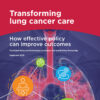Transforming lung cancer care
HPP worked with the International Association for the Study of Lung Cancer to identify opportunities for policy action to improve the lives of people with lung cancer

Context
Lung cancer has a considerable impact on people, health systems and society.
It is the leading cause of cancer-related deaths globally, and the number of people affected continues to rise rapidly; it is estimated that lung, tracheal and bronchial (TBL) cancer will reach 4.4 million cases and result in over 3.4 million deaths by 2050. It takes a significant financial toll, too: TBL cancer is predicted to cost the global economy over USD $3.9 trillion between 2020 and 2050. However, with the right interventions, these impacts could be mitigated.
Reducing people’s exposure to risk factors for lung cancer would lower the number of people who develop the disease. This is important, as the vast majority (80%) of lung cancer cases are due to exposure to risk factors such as tobacco smoking. For people who have already developed lung cancer, it is important that they are diagnosed as early as possible. The earlier people are diagnosed, the better their outcomes and chances for survival; reports suggest that 87% of people diagnosed at stage I via screening programmes could survive 20 years after diagnosis.
Once people are diagnosed, it is vital that they have access to timely and effective care and support to live well beyond the disease; such access can improve disease management and quality of life. But access to quality care and support varies greatly between and within countries due to workforce shortages, limited reimbursement of tests and treatments, a lack of financial support, and gaps in the provision of comprehensive supportive care.
National governments must introduce policies that will help reduce the risk of lung cancer, improve earlier detection and care, and support people to live well beyond the disease.
What we’ve achieved
The Health Policy Partnership has worked with the International Association for the Study of Lung Cancer’s (IASLC’s) Global Policy and Partnerships Committee, other IASLC Committee members, lung cancer clinicians and patient advocates to produce a global report that highlights opportunities for policy action to improve the lives of people with lung cancer. This report was produced following desk research and interviews with experts.
It is the first report from the IASLC’s Global Policy and Partnerships Committee, and aims to drive concerted policy action worldwide to make lung cancer a priority on political agendas. To provide inspiration for change across a variety of health systems and country contexts, the report outlines best-practice examples of how countries are tackling the challenges faced by people with lung cancer. It includes insights from Australia, Belgium, Brazil, England, Japan, South Africa, Taiwan and the US, among others.
This report was launched in Barcelona at the World Conference on Lung Cancer 2025.
Key partners and stakeholders
This project was developed with the support of the following partners and stakeholders:
Experts interviewed for this project
-
Antun Aboud, University Hospital Centre Zagreb, Department of Respiratory Diseases, Croatia
-
Dr Ndubuisi Anumenechi, National Hospital Abuja, Nigeria
-
Professor David Baldwin, University of Nottingham, UK
-
Professor Nirmala Bhoo-Pathy, Universiti Malaya, Malaysia
-
Andrea Borondy Kitts, Rescue Lung Society, US
-
Dr Jose Francisco Corona Cruz, Instituto Nacional de Cancerologia Mexico, Mexico
-
Caleb Egwuenu, Move Against Cancer Africa, Nigeria
-
Associate Professor Joelle Fathi, GO2 for Lung Cancer, US
-
Assistant Professor Kristina Krpina, University Hospital Centre Zagreb, Department of Respiratory Diseases, Croatia
-
Professor Liam Chong Kin, Universiti Malaya, Malaysia
-
Associate Professor Herbert Loong, The Chinese University of Hong Kong, Hong Kong
-
Dr Zulfiquer Otty, Townsville University Hospital, Australia
-
Associate Professor Pang Yong Kek, Universiti Malaya, Malaysia
-
Dr Dimas Pribadi, Universitas Muhammadiyah Surakarta, Indonesia
-
Dr Ahmed Magdy Rabea, National Cancer Institute, Cairo University, Egypt
-
Professor Anand Sachithanandan, Sunway Medical Centre, Lung Cancer Network Malaysia, Malaysia
-
Professor Miroslav Samaržija, University Hospital Centre Zagreb, Department of Respiratory Diseases, Croatia
-
Dr Lucia Viola, Fundación Neumológica Colombiana, Colombia
The IASLC Global Policy and Partnerships Committee
-
Professor Alfredo Addeom, University Hospital Geneva, Switzerland
-
Dr Pedro Aguiar Jr., Grupo Oncoclínicas, Brazil
-
Professor Andreas Charalambous, Cyprus University of Technology, Cyprus
-
Dr Yasushi Goto, National Cancer Center Japan, Japan
-
Professor Fred Hirsch, Icahn School of Medicine at Mount Sinai, US
-
Dr Samuel Kareff, Lynn Cancer Institute, Baptist Health South Florida, US
-
Lillian Leigh, Cancer Institute New South Wales, Australia
-
Dr Gilberto de Lima Lopes Junior, Sylvester Comprehensive Cancer Center at the University of Miami, US
-
Katie Maher, International Association for the Study of Lung Cancer, US
-
Dr Rohan Patel, University Hospitals Seidman Cancer Center, Case Western Reserve University, US
-
Professor CS Pramesh, Tata Memorial Hospital, India
-
Assistant Professor Melody Qu, London Health Sciences Centre, Canada
-
Associate Professor Nicole Rankin, The University of Melbourne, Australia
-
Dr Ambreen Sayani, Women’s College Hospital, University of Toronto, Canada
-
Professor Benjamin Solomon, Peter MacCallum Cancer Centre, Australia
-
Assistant Professor Rajat Thawani, OHSU Knight Cancer Institute, US
-
Dr Ilit Turgeman, Lin Medical Center, Israel
The IASLC committee members who contributed to a survey which informed this project
-
Professor Fredrick Chite Asirwa, International Cancer Institute, Kenya
-
Dr Jhanelle Gray, Moffitt Cancer Center, US
-
Merel Hennink, Global Lung Cancer Coalition, the Netherlands
-
Professor Surender Kashyap, Atal Medical and Research University, India
-
Professor Ella Kazerooni, University of Michigan, US
-
Nabanita Mandal, Chittaranjan National Cancer Institute, India
-
Professor Drew Moghanaki, University of California, Los Angeles, US
-
Professor Anant Mohan, All Indian Institute of Medical Sciences, India
-
Professor Rachael Murray, University of Nottingham, UK
-
Professor In Kyu Park, Seoul National University, South Korea
-
Professor Witold Rzyman, University Clinical Centre, Medical University of Gdańsk, Poland
-
Professor Junichi Soh, Osaka Metropolitan University, Japan
-
Dr Natthaya Triphuridet, Chulabhorn Royal Academy, Thailand
-
Dr Kahren White, Cancer Institute New South Wales, Australia
Project funding
This project was funded by the IASLC. The content was informed by input from various IASLC members, who contributed their time voluntarily.
